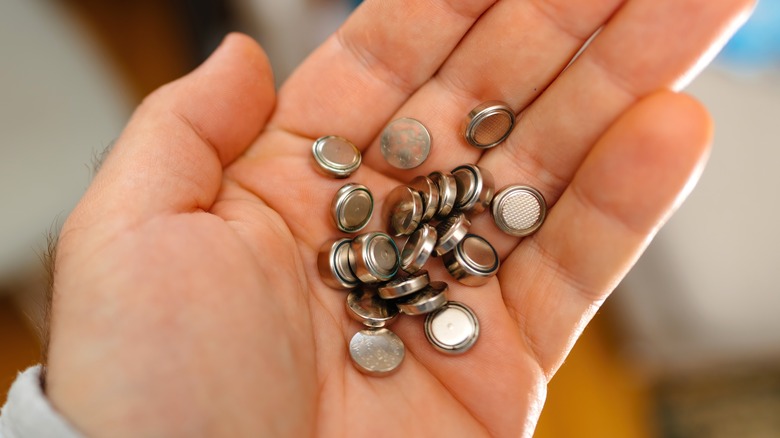What Happens When You Accidentally Swallow A Battery
You might think it's an unlikely scenario for anyone to swallow a battery. However, it does happen from time to time. In fact, more batteries end up in people's stomachs each year than you might suspect: According to the National Capital Poison Center, every year, 3,500 batteries are swallowed by kids and adults.
To be sure, it would be hard to swallow larger batteries, such as those used for smoke detectors and flashlights. But the types of batteries that are commonly ingested are much smaller. Often referred to as "'button" batteries, they're used in electronics, hearing aids, greeting cards, timepieces, and other niche products. Because they're flat, round, and about the size of a breath mint, button batteries might look inviting (even like candy) to children. Being kids, they "try" them — and wind up swallowing something they shouldn't.
What happens then? There are a few potential dangers to swallowing a button battery that you should keep in mind.
Making it harder to breathe
Any small object, including common food items, can become a breathing obstruction or choking hazard if it doesn't go down the throat smoothly. Athough button batteries can fit down most people's throats (with the exception of infants and toddlers), they can still get lodged. When that happens, they can obstruct the airway and make breathing difficult, if not impossible.
Mount Sinai explains that battery buttons that block normal respiratory processes aren't always eaten, either. In many cases, they're put in the nose, breathed into the esophagus, and become stuck.
How can you tell if someone is experiencing breathing issues because of a foreign object like a button battery? You can't, unless you saw the person or child eat the button battery. But you can act quickly if someone around you seems to be choking, wheezing, or having trouble breathing. It doesn't matter if the cause is a button battery. The right decision is to call 911 immediately.
Burning the tissues of the throat
Button batteries that stick in the esophagus don't always interrupt the swallower's breathing. However, if they remain lodged within the folds of the inner throat, they will frequently lead to tissue burns.
It might seem shocking that a small battery could produce enough acid to burn the living tissues around it. But a button battery is still a battery, and Johns Hopkins Medicine reminds everyone that all lithium batteries will undergo a normal chemical reaction in the presence of any moisture. The esophagus is a very moist environment — and once those chemicals start to burn the esophageal tissues, they won't stop until the battery is removed. In very young children, a single battery can burn through the throat in two hours, sometimes leading to the child's death, according to the National Capital Poison Center.
Again, it might be difficult to know if a child or adult in your household has swallowed a button battery by mistake if they complain of a burning sensation in their throat. That's why Johns Hopkins Medicine recommends heading to the nearest emergency room for fast care.
Damaging the stomach or intestinal lining
What happens when a button battery that's been swallowed passes through the esophagus and into the stomach? Eventually, it may find its way through the intestinal tract.
Though modern healthcare practitioners often suggest waiting to see if an ingested button battery is eliminated naturally, some researchers have explored the value of surgery to retrieve swallowed batteries. In a 2020 study in Gastrointestinal Endoscopy, the authors evaluated the value of trying to get button batteries out of the swallower's system using medical interventions. After weighing the risks and benefits of letting the battery "pass" versus taking steps to remove it, they concluded that removing it minimized future gastric damage.
Remember: Button batteries won't necessarily cause any abdominal pain after they've been consumed. However, Nemours KidsHealth warns that children who have eaten button batteries may complain of upset stomachs, may produce bloody, loose stools, and may run a fever. Consequently, if you're suspicious that a child could have swallowed a button battery, getting a diagnosis and treatment right away is the best course of action.
Following practical steps after accidental battery consumption
It goes without saying that knowing your child or loved one swallowed a button battery could put you into panic mode. However, the Cleveland Clinic offers some reminders to stay level-headed in the stressful (and scary) moment.
First, avoid making the individual throw up. Vomiting could exacerbate the problem and might end up lodging the button battery in the throat. Secondly, do not initiate the Heimlich maneuver if you know for a fact that the person has ingested a button battery. If you're unsure why the choking is occurring, call 911 for advice.
Third, if the individual is over one year of age, feed him or her a small amount of honey to slow or stop the chemical reaction of a swallowed battery, as outlined in a 2018 article in the Laryngoscope. Just don't give honey to babies, as it can create a secondary problem. Finally, get to a doctor as soon as possible.
Keeping button batteries where they belong
Fortunately, plenty of button batteries that have been eaten leave the body without doing lasting harm. Nonetheless, consumption of button batteries is serious. It's so serious, in fact, that new consumer protection regulations about battery buttons were passed in 2023.
As explained in a press release from the United States Consumer Product Safety Commission, all manufacturers of products that require button batteries must now follow more rigorous testing rules. That way, children will be less likely to gain easy access to the small batteries. As the Commission noted, more than 70 kids have been fatally harmed by ingesting button batteries. Making the batteries harder to get could prevent future deaths.
You can do your part to keep button batteries out of the reach of youngsters by making sure that you always store them properly. Avoid leaving button batteries or products with easily accessible button batteries within reach of kids. A bit of prevention is all it takes to keep a curious child out of danger.





